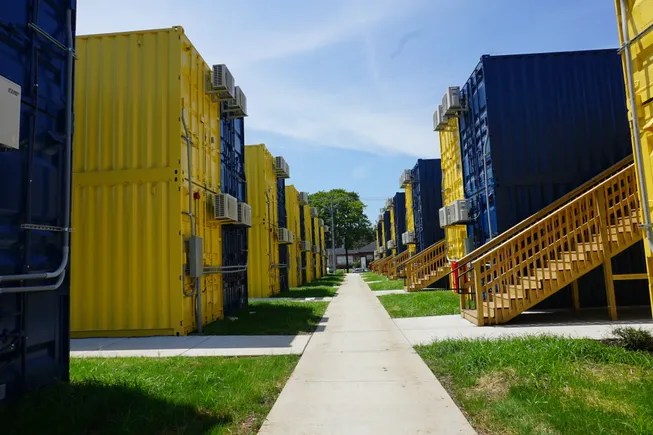Fisk University Embraces Innovation with New Shipping Container Dorms
In an exciting development for students and faculty alike, Fisk University in Nashville, Tennessee, has recently unveiled a new 98-bed student housing complex made entirely from repurposed shipping containers. This unique approach not only addresses the urgent need for on-campus housing but also reflects a growing trend toward sustainability and innovation in construction practices.
A Growing Demand for Student Housing
Fisk University, a historically black liberal arts college, has experienced remarkable growth in its student population, skyrocketing by nearly 70% in the past five years. Currently, the university boasts over 1,000 enrolled students. To accommodate this increase, the university partnered with Nashville-based The Bradley Projects to develop the $4 million shipping container dormitory, which officially opened its doors to students on August 5.
The shipping container complex represents the university’s fifth residence hall and serves as a temporary yet efficient solution to accommodate its rising enrollment while a new, more traditional dormitory building is being constructed. According to Jens Frederiksen, Fisk’s executive vice president, the decision to utilize shipping containers stems from a pressing need for rapid deployment of housing solutions.
Innovative Design and Comfortable Living
The new dormitory complex consists of 40-foot-long shipping containers arranged in blocks of four—stacked two units high and two units wide—connected by wooden staircases leading to the second-floor dormitories. The exterior of the complex is finished in solid blue and gold, reflecting Fisk University’s official school colors.
Inside the units, students will find modern and appealing amenities. Each container is outfitted with wood-like flooring, stainless steel appliances, and recessed lighting, creating an inviting and contemporary living environment. The design efforts were so successful that, according to Frederiksen, “once you walk into one, you forget that you’re in a shipping container.”
The facility was constructed by Custom Container Living, based in Archie, Missouri, and assembled by Nashville’s Certified Construction Services. The combination of effective design and efficient construction practices has resulted in a viable living space that resonates with the current generation’s values of innovation and sustainability.
Student Response and Future Prospects
Early feedback from students moving into the new dormitories has been overwhelmingly positive. Many students have expressed their appreciation for both the layout and functionality of the spaces. Frederiksen notes that the architectural choices made during the design phase were influenced by students’ interests in sustainability and innovative solutions to housing challenges.
What started as a temporary measure may well become a more permanent fixture on campus. Frederiksen anticipates that even after the completion of the new traditional dormitory, the shipping container units will continue to serve the university’s needs. He remarked, “I think it may end up being more permanent than people anticipated.” The flexibility that these units offer is particularly valuable as the university must consider dealing with aging residential infrastructure in the future.
A Unique Approach to Affordable Housing
The use of shipping containers as dormitories is a relatively novel concept in the United States. Fisk’s project is reminiscent of previous housing initiatives, such as two container dorms constructed at the College of Idaho in 2019. While this concept is still emerging in collegiate settings, shipping containers have gained traction in various housing projects, especially as a solution for affordable housing.
In addition to student dorms, many shipping container homes are being built to address homelessness in cities across the nation. Successful projects include the Hilda L. Solis Care First Village in Los Angeles, which features repurposed shipping containers as housing units for homeless individuals and families.
Conclusion
Fisk University’s commitment to responsive, innovative solutions in higher education is commendable. The new shipping container dormitory not only addresses immediate housing needs but also sets a precedent for future construction projects that align with sustainable practices. As more educational institutions face similar challenges, Fisk’s approach may inspire similar solutions that prioritize both student well-being and environmental consciousness. With the success of this project, the university demonstrates that creative and thoughtful solutions can bring about meaningful change, fostering a vibrant community for their growing student body.














